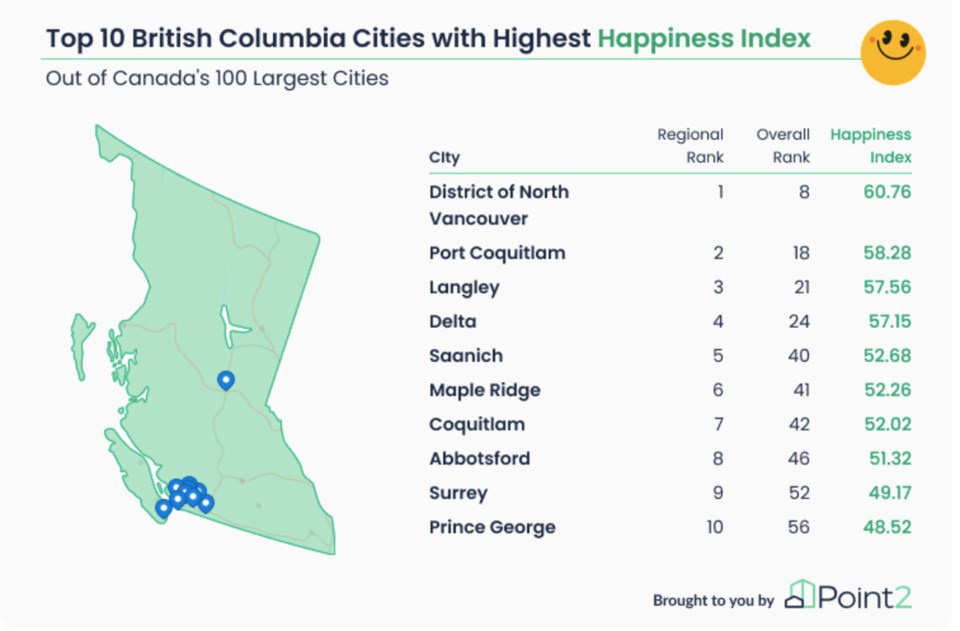Notice a pep in the step of your North Vancouver neighbours?
A certain twinkle in their eyes?
Turns out, there could be reason for that.
According to a , a real estate marketing and analysis company, North Vancouver is the happiest city in B.C.
It’s also the only city in B.C. to crack the top 10 “happiest” cities in Canada. (Eight of those are in Ontario.)
High household income among factors
While it can’t buy happiness, a comfortable standard of living is likely a good down payment on Zen, according to the number crunchers.
The District of North Vancouver’s median after-tax household income of $106,000 is $33,000 above the national average.
To come up with the happiness rankings, the real estate marketing company analyzed 30 metrics for 100 of Canada’s largest cities.
Among the other factors examined were percentage of households who were also homeowners, percentage of the population spending less than 30 per cent of their income on housing, the unemployment rate, inequality index, life expectancy, perceived health status and stress levels, hours worked, participation in sports and exercise, volunteer and charity donor rate, weather, as well as arts and heritage organizations. The analysis also looked at crime levels, commute times, percentage of residents who were divorced or separated, and the percentage of people who moved to the city in the past five years.
Much of the information came from Statistics Canada, as well as other government sources like Environmental Canada, said spokesperson Sabina Boboc.
So, what makes one city “happier” than another?
Caledon, Ontario ranked 'happiest' city in Canada
Just as in real life, there is no absolute happiness, as none of the largest cities in Canada ranked high in every measurement (which would have given a city a “maximum happiness” score of 100), the company noted. In fact, the “happiest” city in the country – Caledon, Ontario – earned the title with a “happiness index” of 67 out of 100.
In comparison, North Vancouver scored a “happiness index” of 60.76.
Good weather + fewer working hours = more happiness
Other B.C. cities scoring high on the “happiness index” included Port Coquitlam, Langley, Delta, Saanich, Maple Ridge, Coquitlam, Abbotsford, Surrey and Prince George.
Good weather and fewer working hours than the rest of the country were among the factors contributing to bliss in Lotus Land.

Good health, less stress also important
In addition, all B.C. cities included in the analysis boasted unemployment rates under 10 per cent, and poverty rates below 15 per cent. Around 60 per cent of their residents also reported that they are in very good or excellent health with less than 25 per cent perceiving everyday life as “quite a bit” or “extremely” stressful.
Among other B.C. statistics from the marketing company’s number crunching:
- Delta residents enjoy the best weather, with an annual median temperature of 11 C.
- Nanaimo has the best air quality among Canada’s 100 largest cities.
- Kelowna is the least happy city within the province (ranking 81st out of 100 among the largest cities in Canada), but the city ranks high in terms of community and environment. Notably, more than 73 per cent of Kelowna residents report a strong sense of belonging.
- Vancouver is nowhere near the top of the list of happiest cities in Canada, ranking 67th. However, one thing residents here can be happy about is that it’s the most walkable city among the country’s 100 largest.
- In Prince George, more than 84 per cent of residents spend less than 30 per cent of their income on housing.
- Almost 82 per cent of Langley residents own their homes. At the same time, the city also has one of the smallest unemployment rates among all cities analyzed.
- Richmond residents have the highest life expectancy (almost 87 years old).
- Surrey has some of the smallest shares of people who’ve divorced or separated.
Social connection key to lasting happiness
According to , factors that contribute to the greatest happiness over a lifetime include not sweating the small stuff and maintaining satisfying social connections, whether that’s with family members, close friends, colleagues or casual contacts.
Closer to home, B.C.’s Centre for Disease Control is currently conducting the third which also measures population health based on a variety of physical and mental health factors as well as measurements of social, economic and community well-being. The survey is open to all British Columbians 18 and older.




